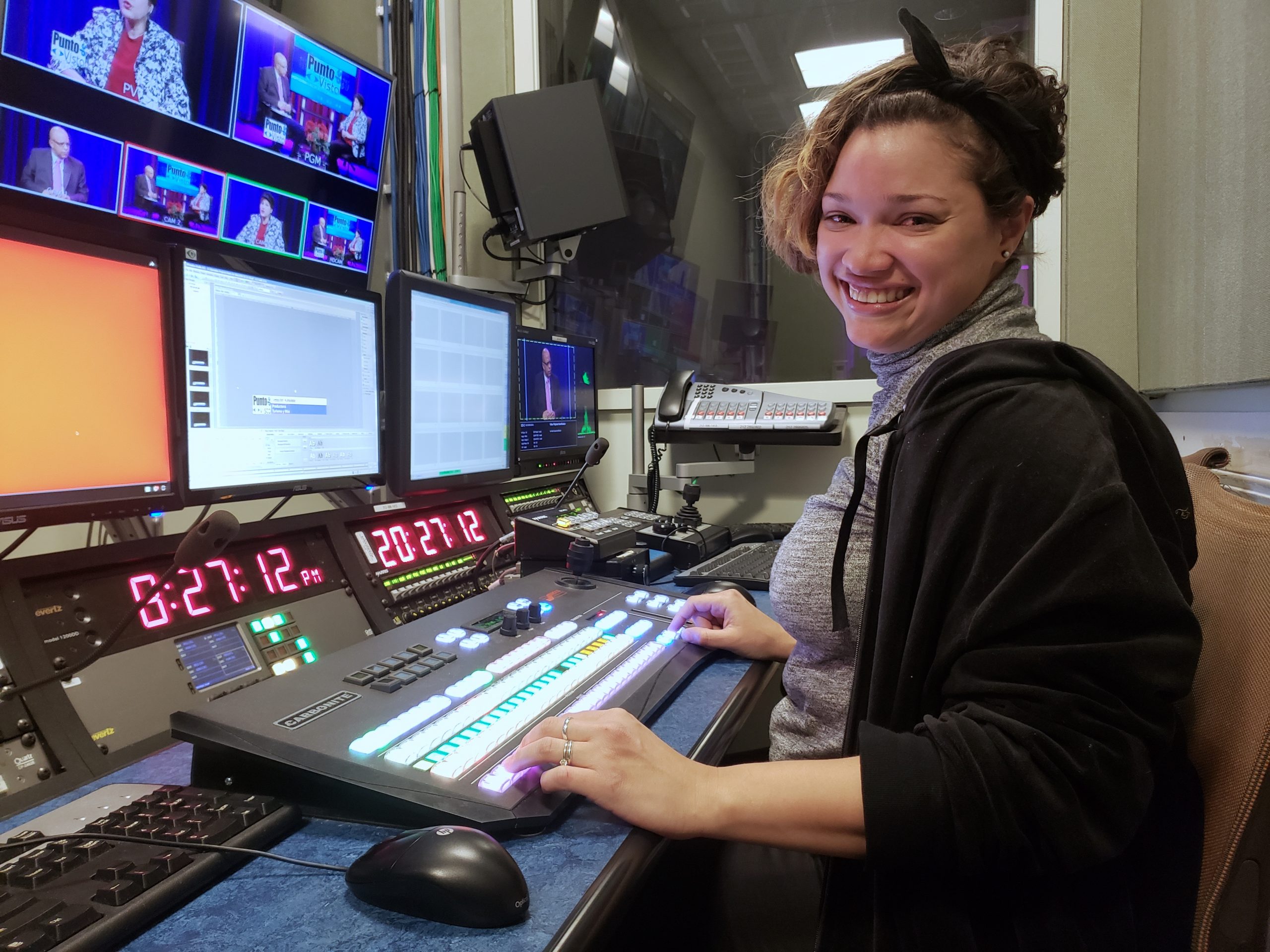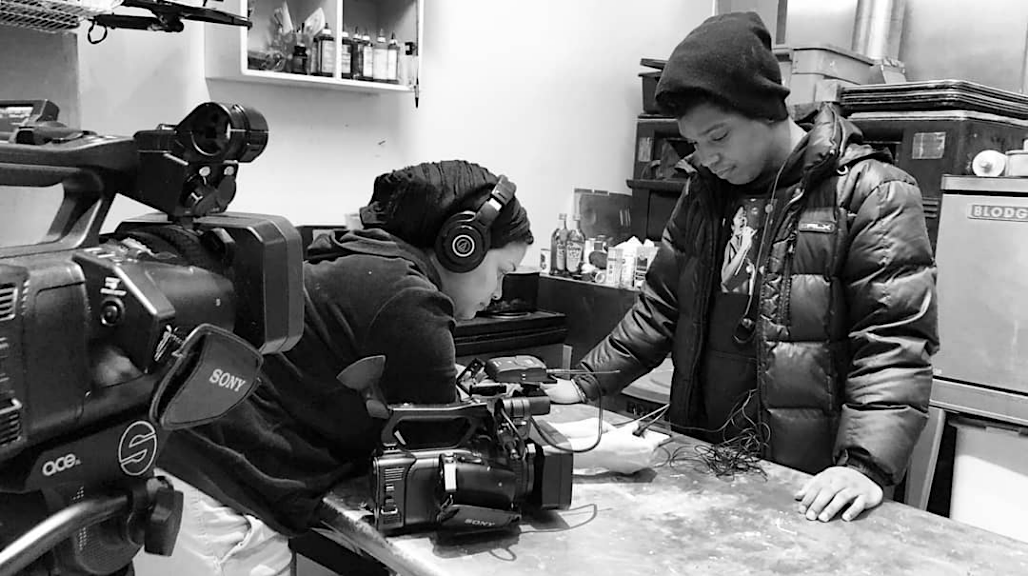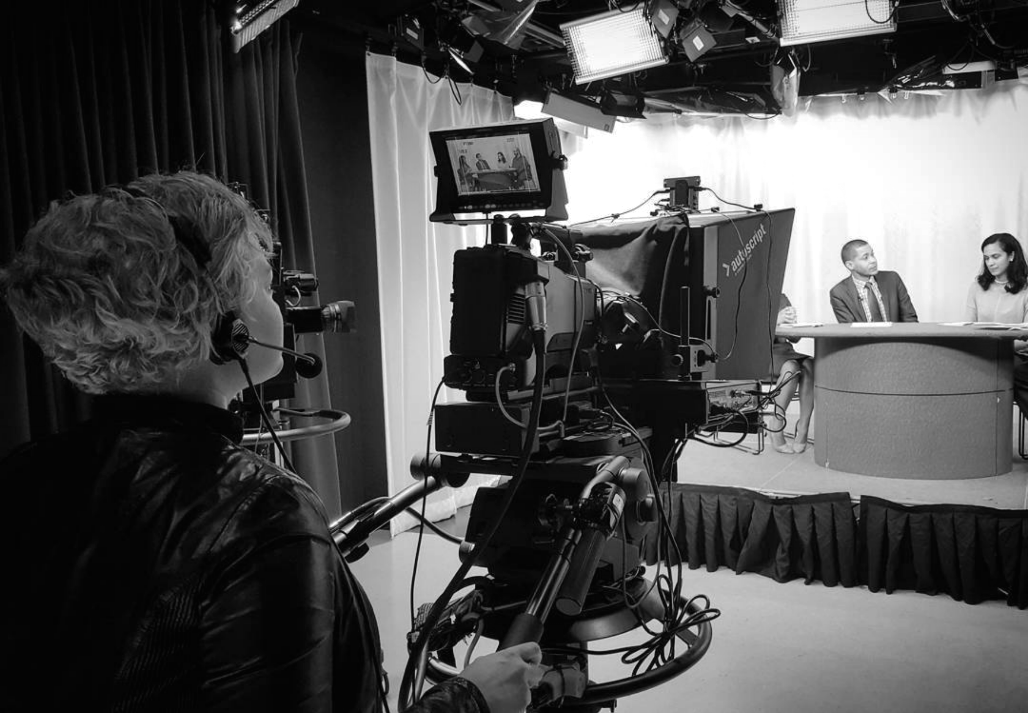
March 10, 2021
Street vendors are a vital part of the cultural and economic fabric of New York City. Buhoneros (Street Vendors), a 10–minute documentary film by Borough of Manhattan Community College (BMCC/CUNY) alumna Carla Franchesca Robles (Video Arts and Technology, ‘16), follows the daily life and challenges faced by several of New York City’s 20,000 street vendors, most of whom are immigrants and people of color.
“That documentary was born in a class at BMCC,” says Robles. “Professor [Anastassios] Rigopoulos—we call him ‘Tassos’—was an inspiration for me. From pre- to post-production and afterwards, when I was sending the film to festivals, he helped me out. Even after I graduated from BMCC and was at City College, I was talking to him about my thesis.”
Buhoneros was Robles’ first documentary project, “and that’s when I fell in love with the genre,” she says.
One of the film’s subjects, a woman who moved to New York from Ecuador, says she has been selling underwear on the same Dyckman Street corner in the upper Manhattan neighborhood of Inwood for almost 30 years. Operating without a license has made her vulnerable to police raids in which her products were confiscated.
“Hot in summer, cold in winter—this is how she survives,” says Robles. For decades, she explains, there was a limit of 3,000 permits set by the New York City Council, and a two-year permit, issued by the city for $200, could cost up to $25,000 on the black market.
Things improved for street vendors in January 2021, when the City Council voted to lift the cap on permits after years of lobbying by groups including the Street Vendor Project. Those protests in City Hall Park are highlighted in Buhoneros, and the film was featured at more than 10 festivals, including the 2017 Dominican Film Festival in New York where it was an Official Selection.
An internship at BMCC evolves into a film production career
While Robles was making Buhoneros, she was a full-time student at BMCC completing her associate degree in Video Arts and Technology, working in a clothing store in midtown Manhattan and starting her family with the birth of her first child.
As filmmaking became more of a priority, she led the Society of Motion Picture and Television Engineers (SMPTE) Student Chapter at BMCC and left her retail job to complete an internship through the college that evolved into her current position as production facilitator at MNN El Barrio Firehouse Community Media Center, a public-access television station in Manhattan.

“My work at MNN is very hands-on,” Robles says. “I get to help our community producers with their television shows for public access TV, in both Spanish and English. Also, I work on our own in-house productions, community events, art exhibits and other projects.”
MNN is currently closed to the public due to COVID-19, but the Production Department has developed strategies to produce content remotely and continue broadcasting to cable channels and through social media, Robles says.
When Covid restrictions lift, she will return to the studios and resume her work with manual and robotic cameras, lights, teleprompter, audio boards and graphic generator software. She is also in charge of renting field equipment to the community producers and provides support to them, at the editing stations.
On some occasions, she has had the opportunity to teach workshops and media-related classes. And every Thursday, she is in charge of the live taping of “Punto de Vista con Carlos Cabrera,” a series that covers events affecting the Spanish-speaking community in New York City.
Robles develops her talent in City College’s first documentary film graduating class
Born in Santo Domingo, the Dominican Republic, Robles attended Universidad Autónoma de Santo Domingo and moved to New York with her family in 2010.
After earning her associate degree at BMCC, she transferred to the Bachelor of Fine Arts (BFA) program in Film and Video at The City College of New York, CUNY, graduating Summa Cum Laude in 2019 through the college’s first documentary track.
At City College, Robles completed films including Layers of a Baker, which follows the daily life of a pastry chef who moved to New York from the Dominican Republic and owns his own bakery in upper Manhattan.
Through lingering close-ups of the baker preparing dough, pulling trays out of the large ovens and expertly squeezing out tubes of frosting, the film showcases the artistry that underlies his financial struggles.
“I wanted people to know how difficult it is for small businesses to survive,” Robles says. “For this baker, it was not only the economic but the emotional factor that was hard for him. He ended up living in the bakery.”
Rayoelú Films, founded by Robles, highlights immigrant stories
As Robles continued making films, she volunteered for the NYC Havana Film Festival, the Colombian Film Festival in New York, Food Film Fest and the 54 New York Film Festival.
In 2016, Robles created her own film production company, Rayoelú Films. “The mission of my company is to raise the voices of the unheard,” she says. “I want to tell their stories in film, and bring an audience to those who have been ignored.”
Robles’ husband, Francis Mateo, is part of the Rayoelú Films team. He graduated from BMCC in 1998 and went on to earn a bachelor’s degree in English Literature at Hunter College, CUNY, then a Master of Fine Arts in Theater at Brooklyn College, CUNY. Their family grew with the birth of a second child in 2018.

Another team member is José R. Ponce. “We met at BMCC while I was taking a tour of the editing lab,” Robles says. “José was working on a documentary about Black Lives Matter. We then took a class together and became friends. Now he is one of my closest collaborators.”
Ponce and Robles graduated together from the Video Arts and Technology program at BMCC in 2017. “Then we were both accepted at City College in their competitive film program that only accepts 25 students a year. We graduated together once again in 2019,” says Robles.
Dramatic series highlights communities of NYC not often seen in film
In 2020, Robles became a member of New York Women in Film and Television (NYWIFT).
“This is still a male-dominant industry,” Robles says. “Even now in 2021, we are fighting to get the opportunities we deserve. There are a lot of women working hard in the industry just like men and earning less—now imagine you’re Latina or Black or any other minority. That makes it even harder.”
Breaking barriers on many levels—for people of color, immigrants and women—is key to the mission of Rayoelú Films.
“We are always working on a new project,” Robles says. “Before COVID-19 hit in March 2020, my husband and I were working on a teaser for the second episode of what we intend to be a mini-series called Fran Gil, Notario P.I.”
Through the main character of that series, Robles says, “We show why community activism is important, why being vigilant matters, and why trust among the residents is so valuable.”
That series is set in the heart of the Inwood and Washington Heights communities of upper Manhattan.
“Each 15-minute episode introduces the cases that the character Fran Gil—played by Francis Mateo—will need to solve. With every shot and camera angle, we seek to accentuate the neighborhood’s beauty and diversity, allowing for more people to learn about our rich community.”
Robles also recently directed a music video for a singer she met as a student at BMCC, and she is in the pre-production stage of another documentary.
“People come to New York City trying to make a better life and they find so many different ways to do that,” she says. “Some succeed and some struggle. All these stories are important.”
STORY HIGHLIGHTS
- BMCC alumna Carla Franchesca Robles (Video Arts and Technology, ‘16) went on to earn a BFA in Film and Video at City College of New York, CUNY and founded the production company Rayoelú Films
- Robles’s critically recognized films feature immigrants in New York City as they start businesses and seek better lives
- An internship at BMCC evolved into Robles’ current position as production facilitator at MNN El Barrio Firehouse Community Media Center, the public access television in Manhattan

